Submissions: 2023 May
Submissions: 2023 May
__________________________________________________________________________________________________
Please post your images here.
Please see this thread before posting images; posting images demonstrates your agreement with
the possible uses for your image.
If hotlinking to an image, please ensure it is under 500K.
Hotlinks to images over 500K slow down the thread too much and will be disabled.
Thank you!
_________________________________________________________________________________________________
<- Previous submissions
Please post your images here.
Please see this thread before posting images; posting images demonstrates your agreement with
the possible uses for your image.
If hotlinking to an image, please ensure it is under 500K.
Hotlinks to images over 500K slow down the thread too much and will be disabled.
Thank you!
_________________________________________________________________________________________________
<- Previous submissions
Know the quiet place within your heart and touch the rainbow of possibility; be
alive to the gentle breeze of communication, and please stop being such a jerk. — Garrison Keillor
alive to the gentle breeze of communication, and please stop being such a jerk. — Garrison Keillor
-
barretosmed
- Science Officer
- Posts: 482
- Joined: Thu Oct 12, 2017 6:04 pm
Re: Submissions: 2023 May
MILKY WAY AND THE ATACAMA DESERT
BEST DETAILS:
https://www.astrobin.com/full/uokco1/B/
EQUIPMENT AND DATA:
Canon 6D
Canon lens 24mm 1.4
smarteq pro
1 x 59"
1 x 59" with sky traking
ISO 3200 f3.5
LOCATION: San Pedro de Atacama - Chile
DATE 04/18/2023
Author: Fernando Oliveira de Menezes
(Organizing author of the book Amateur Astrophotography in Brazil)
https://clubedeautores.com.br/livro/ast ... lCopyright: Your name
BEST DETAILS:
https://www.astrobin.com/full/uokco1/B/
EQUIPMENT AND DATA:
Canon 6D
Canon lens 24mm 1.4
smarteq pro
1 x 59"
1 x 59" with sky traking
ISO 3200 f3.5
LOCATION: San Pedro de Atacama - Chile
DATE 04/18/2023
Author: Fernando Oliveira de Menezes
(Organizing author of the book Amateur Astrophotography in Brazil)
https://clubedeautores.com.br/livro/ast ... lCopyright: Your name
-
PatrickWinkler
- Ensign
- Posts: 82
- Joined: Wed May 25, 2016 4:24 pm
- Location: Traiskirchen (Austria)
- Contact:
-
PatrickWinkler
- Ensign
- Posts: 82
- Joined: Wed May 25, 2016 4:24 pm
- Location: Traiskirchen (Austria)
- Contact:
-
PatrickWinkler
- Ensign
- Posts: 82
- Joined: Wed May 25, 2016 4:24 pm
- Location: Traiskirchen (Austria)
- Contact:
-
PatrickWinkler
- Ensign
- Posts: 82
- Joined: Wed May 25, 2016 4:24 pm
- Location: Traiskirchen (Austria)
- Contact:
-
PatrickWinkler
- Ensign
- Posts: 82
- Joined: Wed May 25, 2016 4:24 pm
- Location: Traiskirchen (Austria)
- Contact:
Re: Submissions: 2023 May
The Milkyway over Qussur Al Arab Rock
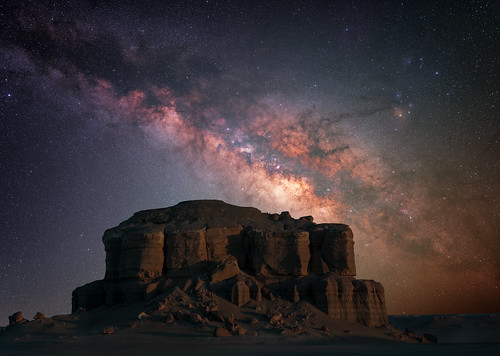 The Milkyway over Qussur Al Arab Rock by Ahmed Waddah, on Flickr
The Milkyway over Qussur Al Arab Rock by Ahmed Waddah, on Flickr
Image is a composite where sky and foreground were imaged on different nights.
Sky: Nikon Z6II - Nikon Z 14-24mm f/2.8 S
19x180" - SO 800 - f/.2.8 @24mm
17th of April - Al Fayoum Desert, Egypt
Foreground: Nikon Z6II - Rokinon 135mm f/2 - HDR before sunset @ f/8 - ISO 100
https://www.astrobin.com/88s89y/
Facebook: https://www.facebook.com/waddah.photography
Astrobin: https://www.astrobin.com/users/WolfHeart/
IG: https://www.instagram.com/waddahphotography/
 The Milkyway over Qussur Al Arab Rock by Ahmed Waddah, on Flickr
The Milkyway over Qussur Al Arab Rock by Ahmed Waddah, on FlickrImage is a composite where sky and foreground were imaged on different nights.
Sky: Nikon Z6II - Nikon Z 14-24mm f/2.8 S
19x180" - SO 800 - f/.2.8 @24mm
17th of April - Al Fayoum Desert, Egypt
Foreground: Nikon Z6II - Rokinon 135mm f/2 - HDR before sunset @ f/8 - ISO 100
https://www.astrobin.com/88s89y/
Facebook: https://www.facebook.com/waddah.photography
Astrobin: https://www.astrobin.com/users/WolfHeart/
IG: https://www.instagram.com/waddahphotography/
- Vitopastorini
- Asternaut
- Posts: 4
- Joined: Wed Apr 05, 2023 11:22 pm
- AKA: Rodrigo Pastor Pensa
- Location: Temuco, Chile
- Contact:
Re: Submissions: 2023 May
Story:
Andromeda galaxy over Villarrica volcano, one of the most active volcanoes in Chile and one of a small number worldwide known to have an active lava lake within its crater. The images were taken near Coñaripe town on the shores of Calafquen lake, Los Ríos district, Chile. As you know, here in the southern hemisphere it is not too easy to see and photograph andromeda because of its altitude (9° from here, its maximum altitude at 39° South) and just for a couple of months a year. This picture was taken on november 8, 2021 23:10, with a waxing crescent moon 22% illuminated. The equipment I used was a Nikon D850 camera and a Rokinon 135mm telephoto lens to capture a bigger andromeda with an interesting foreground object, in this case the volcano. This is not a composite image or blending mode therefore I didn't use a star tracker, they were taken in a single shot wide open at f2, ISO 3200 and 5s shutter speed to avoid star trails. I used Topaz Photo AI for noise reduction and to improve quality and lightroom with the usual workflow, and in the case of the timelapse LRtimelapse.
link of interest:
https://en.wikipedia.org/wiki/Villarrica_(volcano)
this picture is a frame part of a short timelapse video i made too and you can watch it here:
https://1drv.ms/v/s!AmCnYt9akUdHgoxEsaa ... w?e=Up7Koc
(if you dont have a microsoft account, I think you can watch it in Microsft Edge without signing in)
Exif:
Nikon D850
Rokinon 135 f/2.0 ED UMC Lens
5 sec f/2 ISO 3500
Copyright: Rodrigo Pastor Pensa
ig: @vitopastorini
Andromeda galaxy over Villarrica volcano, one of the most active volcanoes in Chile and one of a small number worldwide known to have an active lava lake within its crater. The images were taken near Coñaripe town on the shores of Calafquen lake, Los Ríos district, Chile. As you know, here in the southern hemisphere it is not too easy to see and photograph andromeda because of its altitude (9° from here, its maximum altitude at 39° South) and just for a couple of months a year. This picture was taken on november 8, 2021 23:10, with a waxing crescent moon 22% illuminated. The equipment I used was a Nikon D850 camera and a Rokinon 135mm telephoto lens to capture a bigger andromeda with an interesting foreground object, in this case the volcano. This is not a composite image or blending mode therefore I didn't use a star tracker, they were taken in a single shot wide open at f2, ISO 3200 and 5s shutter speed to avoid star trails. I used Topaz Photo AI for noise reduction and to improve quality and lightroom with the usual workflow, and in the case of the timelapse LRtimelapse.
link of interest:
https://en.wikipedia.org/wiki/Villarrica_(volcano)
this picture is a frame part of a short timelapse video i made too and you can watch it here:
https://1drv.ms/v/s!AmCnYt9akUdHgoxEsaa ... w?e=Up7Koc
(if you dont have a microsoft account, I think you can watch it in Microsft Edge without signing in)
Exif:
Nikon D850
Rokinon 135 f/2.0 ED UMC Lens
5 sec f/2 ISO 3500
Copyright: Rodrigo Pastor Pensa
ig: @vitopastorini
Re: Submissions: 2023 May
This is an LRGB image of the Antennae Galaxies in Corvus. It is 21.25 hours of LRGB data taken with an FLI ML16803 camera on a Planewave CDK14 all riding on an Astro-Physics 1600GTO mount located at Sierra Remote Observatories in California. The image was processed with PixInsight.
Although this is somewhat low for our location -- the galaxies only peak at 34 degrees altitude -- they are so interesting that it was worth spending the nights between 17 and 27 April grabbing frames and dodging clouds, a few hours at a time.
The thing that makes this so interesting is that even though we see only one moment in time we can get a sense of the gravitational dance these galaxies are engaged in. It may be one moment but it feels like the past and future are there to see. And it does it while looking good!
Although this is somewhat low for our location -- the galaxies only peak at 34 degrees altitude -- they are so interesting that it was worth spending the nights between 17 and 27 April grabbing frames and dodging clouds, a few hours at a time.
The thing that makes this so interesting is that even though we see only one moment in time we can get a sense of the gravitational dance these galaxies are engaged in. It may be one moment but it feels like the past and future are there to see. And it does it while looking good!
Re: Submissions: 2023 May
M33 is apart of the local group of galaxies that include our Milky Way and Andromeda. Like Andromeda it is visible with the naked eye in clear dark skies.M33 is also on a collision course with the Milky Way and Andromeda and in several billion years time they will all be merged into one galaxy.
Shot on a ZWO ASI 2600 MC PRO and TS Optics 90mm F6 APO CF Refractor Telescope.
45x600" Exposures. Shot in a Bortle 2 zone in central Texas back on September 27, 2022
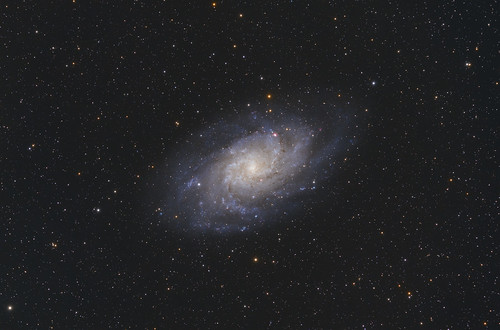 M33 - Triangulum Galaxy by Harley Grady, on Flickr
M33 - Triangulum Galaxy by Harley Grady, on Flickr
Shot on a ZWO ASI 2600 MC PRO and TS Optics 90mm F6 APO CF Refractor Telescope.
45x600" Exposures. Shot in a Bortle 2 zone in central Texas back on September 27, 2022
 M33 - Triangulum Galaxy by Harley Grady, on Flickr
M33 - Triangulum Galaxy by Harley Grady, on FlickrRe: Submissions: 2023 May
Sun's corona (total solar eclipse 2023)
Copyright Junho Oh, Byoungjun Jeong
4k resolution
https://www.astrobin.com/54qzoa/
4k resolution
https://www.astrobin.com/54qzoa/
Re: Submissions: 2023 May
The Triangulum Galaxy, also known as M33 and NGC 598, is a spiral galaxy of the SA(s)cd type located about 3 million light-years from Earth and located in the constellation Triangulum. In the Anglo-Saxon world M33 is also informally called Pinwheel Galaxy (in Italian literally Girandola Galaxy) in some amateur astronomy publications, but also in some official press releases of professional sites.
The Triangulum Galaxy is a rather small galaxy compared to its neighbors — the Milky Way and the Andromeda Galaxy — but it is actually average in size compared to the other spiral galaxies in the Universe. In particular, it is the third largest member of the Local Group, after the Andromeda Galaxy and the Milky Way, and could be a companion of the same Andromeda Galaxy to which it is gravitationally linked. It has two possible low-luminosity satellites: Andromeda XXII and Pisces VII. The Pisces Dwarf Galaxy I (or LGS 3), sometimes referred to as a satellite of M33, has never been confirmed in that role.
From the point of view of its conformation, M33 is an example of a flake spiral. Spiral galaxies can have homogeneous and well-defined arms, or arms in which the dust and gas are not distributed uniformly but aggregated in local collapses. The more or less homogenous distribution of the galactic material is thought to depend on the strength of a density wave that carries the material and, in effect, gives rise to the arms themselves. If the density wave is powerful, the material arranges itself in neat and homogeneous arms; if instead the wave is weak or absent, the material aggregates in lumps. The latter situation gives rise to the typical "flaky" appearance of flaky spiral galaxies.
The Triangulum galaxy has a nucleus with spectral characteristics similar to those of an H II region and therefore does not present the violent phenomena typical of active galactic nuclei or Seyfert galaxies.
In 2005, using VLBA observations of two water masers on opposite sides of the galaxy, astronomers were able to estimate for the first time the angular rotation and proper motion of the Triangulum galaxy. The calculated speed is equal to about 190±60 km/s, relative to the Milky Way, which means that M33 is moving towards the Andromeda galaxy.
In 2007, the Chandra X-ray space observatory found evidence of a 15.7 M⊙ black hole belonging to the Triangulum galaxy; the object, dubbed M33 X-7, orbits a companion star that eclipses it every 3.5 days.
Six nines have been observed in the galaxy so far.
TS RC 12” truss telescope
Ioptron Cem120 mount
Moravian off-axis guider with Moravian G0300 camera
Moonlite 3.6” electronic focuser and rotator
Camera Moravian G8300 with internal wheel
Astronomik CLS filters Ccd, R, G, B, Ha, OIII
61 X 300s Cls Ccd -20°
31 X 240s X RGB -20°
15 X 900s Has 6nm -20°
15 X 900s OIII 6nm -20°
The Triangulum Galaxy is a rather small galaxy compared to its neighbors — the Milky Way and the Andromeda Galaxy — but it is actually average in size compared to the other spiral galaxies in the Universe. In particular, it is the third largest member of the Local Group, after the Andromeda Galaxy and the Milky Way, and could be a companion of the same Andromeda Galaxy to which it is gravitationally linked. It has two possible low-luminosity satellites: Andromeda XXII and Pisces VII. The Pisces Dwarf Galaxy I (or LGS 3), sometimes referred to as a satellite of M33, has never been confirmed in that role.
From the point of view of its conformation, M33 is an example of a flake spiral. Spiral galaxies can have homogeneous and well-defined arms, or arms in which the dust and gas are not distributed uniformly but aggregated in local collapses. The more or less homogenous distribution of the galactic material is thought to depend on the strength of a density wave that carries the material and, in effect, gives rise to the arms themselves. If the density wave is powerful, the material arranges itself in neat and homogeneous arms; if instead the wave is weak or absent, the material aggregates in lumps. The latter situation gives rise to the typical "flaky" appearance of flaky spiral galaxies.
The Triangulum galaxy has a nucleus with spectral characteristics similar to those of an H II region and therefore does not present the violent phenomena typical of active galactic nuclei or Seyfert galaxies.
In 2005, using VLBA observations of two water masers on opposite sides of the galaxy, astronomers were able to estimate for the first time the angular rotation and proper motion of the Triangulum galaxy. The calculated speed is equal to about 190±60 km/s, relative to the Milky Way, which means that M33 is moving towards the Andromeda galaxy.
In 2007, the Chandra X-ray space observatory found evidence of a 15.7 M⊙ black hole belonging to the Triangulum galaxy; the object, dubbed M33 X-7, orbits a companion star that eclipses it every 3.5 days.
Six nines have been observed in the galaxy so far.
TS RC 12” truss telescope
Ioptron Cem120 mount
Moravian off-axis guider with Moravian G0300 camera
Moonlite 3.6” electronic focuser and rotator
Camera Moravian G8300 with internal wheel
Astronomik CLS filters Ccd, R, G, B, Ha, OIII
61 X 300s Cls Ccd -20°
31 X 240s X RGB -20°
15 X 900s Has 6nm -20°
15 X 900s OIII 6nm -20°
-
Marion
Re: Submissions: 2023 May
 Fly away with the dust by Marion Kabac, sur Flickr
Fly away with the dust by Marion Kabac, sur Flickr« Fly away with the dust, come back with springtime. »
I often create songs and melodies in my dreams, and I forget them when I wake up. However, when I dream of photography, I remember everything and I do my best to recreate the shot I imagined in my sleep. Here is one of them : a gentle duet with the Pleiades cluster, in the blue velvet of the night. I waited for the Taurus constellation to get closer to the western horizon, and I hugged the stars in a self-portrait photograph.
- Canon 6dii + 70-200mm at 200mm
- single shot : 5s at f/4, iso 3200
- self-portrait using a wifi remote + 10s timer
- shot at Aix-en-Provence, France
Marion
Re: Submissions: 2023 May
Blue Horse Head Nebula (IC4592) - 2 panel mosaic
Equipment: William Optics GT71, ZWO ASI2600mm pro, Paramount MX+
Data: 180s frames, RGB, 4 hours per panel (8 hours total)
Credit: Andrea Bergamini and Sameer Bharadwaj
Location: Own remote observatory e-Eye, Spain, Bortle 3
Date: May 2023
Higher resolution: https://www.astrobin.com/onxjqr/
Equipment: William Optics GT71, ZWO ASI2600mm pro, Paramount MX+
Data: 180s frames, RGB, 4 hours per panel (8 hours total)
Credit: Andrea Bergamini and Sameer Bharadwaj
Location: Own remote observatory e-Eye, Spain, Bortle 3
Date: May 2023
Higher resolution: https://www.astrobin.com/onxjqr/
-
Carballada
- Ensign
- Posts: 22
- Joined: Sat Mar 16, 2019 10:19 am
Re: Submissions: 2023 May
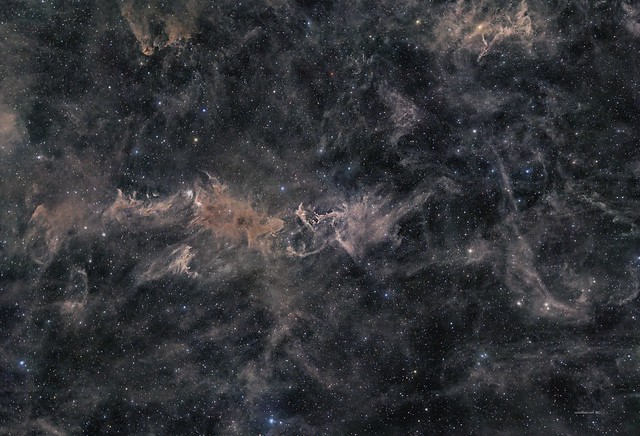
The Fighting Dragons on Cepheus (LBN552 and LBN1228 wide field on LRGB) by Jose Carballada, on Flickr
The field of view (FOV) was amazing, covering a wide angle of 5º, here is with the moon as example
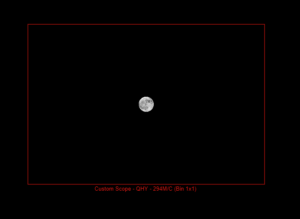
LBN 1228 is a region of gas and dust that is illuminated by the intense radiation from nearby young, hot stars.
It is also sometimes referred to as Sharpless 2-132 or Sh2-132.LBN 552, on the other hand, is also an emission nebula located in the same region of the sky as LBN 1228, and is sometimes referred to as Sharpless 2-138 or Sh2-138.
It is thought to be approximately 4,000 light-years away from Earth and is estimated to be around 30 light-years across.
Like LBN 1228, LBN 552 is a region of gas and dust that is illuminated by nearby young, hot stars.
t is also known for its intricate filaments of gas and dust, which create a beautiful and unique appearance.
-
barretosmed
- Science Officer
- Posts: 482
- Joined: Thu Oct 12, 2017 6:04 pm
Re: Submissions: 2023 May
The open cluster in the constellation Centaurus - NGC 5460
MORE DETAILS
https://www.astrobin.com/full/xty65y/0/
EQUIPMENT:
ZWO ASI 6200MC COLED
Esprit 150mm
108 X 100"
DATE: 03/30/2023 and 04/04/2023
Location: Munhoz - MG - Brazil
PROCESSING AND CAPTURE:
Adobe Lightroom Classic · Adobe Photoshop · Pleiades Astrophoto PixInsight
Author: Fernando Oliveira de Menezes
Email: Barretosmed@hotmail.com
(Organizing author of the book Astrofotografia Amadora no Brasil)
[https://clubedeautores.com.br/livro/ast ... -no-brasil](https://clubedeautores.com.br/livro/ast ... -no-brasil)Copyright: Your name
MORE DETAILS
https://www.astrobin.com/full/xty65y/0/
EQUIPMENT:
ZWO ASI 6200MC COLED
Esprit 150mm
108 X 100"
DATE: 03/30/2023 and 04/04/2023
Location: Munhoz - MG - Brazil
PROCESSING AND CAPTURE:
Adobe Lightroom Classic · Adobe Photoshop · Pleiades Astrophoto PixInsight
Author: Fernando Oliveira de Menezes
Email: Barretosmed@hotmail.com
(Organizing author of the book Astrofotografia Amadora no Brasil)
[https://clubedeautores.com.br/livro/ast ... -no-brasil](https://clubedeautores.com.br/livro/ast ... -no-brasil)Copyright: Your name
- Vitopastorini
- Asternaut
- Posts: 4
- Joined: Wed Apr 05, 2023 11:22 pm
- AKA: Rodrigo Pastor Pensa
- Location: Temuco, Chile
- Contact:
Re: Submissions: 2023 May
Story:
Andromeda galaxy over Villarrica volcano, one of the most active volcanoes in Chile and a small number worldwide known to have an active lava lake within its crater. The images were taken near Coñaripe town on the shores of Calafquen Lake, Los Ríos district, Chile. As you know, here in the southern hemisphere it is not easy to see and photograph Andromeda because of its altitude (9° from here, its maximum altitude at 39° South) and just for a couple of months a year. This picture was taken on November 8, 2021, at 23:10, with a waxing crescent moon 22% illuminated. I used a Nikon D850 camera and a Rokinon 135mm telephoto lens to capture a bigger Andromeda with an interesting foreground object, in this case, the volcano. This is not a composite image or blending mode therefore I didn't use a star tracker, they were taken in a single shot wide open at f2, ISO 3200, and 5s shutter speed to avoid star trails. I used Topaz Photo AI for noise reduction and to improve quality and lightroom with the usual workflow and in the case of the timelapse, LRtimelapse.
link of interest:
https://en.wikipedia.org/wiki/Villarrica_(volcano)
this picture is a frame part of a short timelapse video I made too and you can watch it here:
https://1drv.ms/v/s!AmCnYt9akUdHgoxEsaa ... w?e=i2cm1v
Exif:
Nikon D850
Rokinon 135 f/2.0 ED UMC Lens
5 sec f/2 ISO 3500
Copyright: Rodrigo Pastor Pensa
ig: @vitopastorini
Andromeda galaxy over Villarrica volcano, one of the most active volcanoes in Chile and a small number worldwide known to have an active lava lake within its crater. The images were taken near Coñaripe town on the shores of Calafquen Lake, Los Ríos district, Chile. As you know, here in the southern hemisphere it is not easy to see and photograph Andromeda because of its altitude (9° from here, its maximum altitude at 39° South) and just for a couple of months a year. This picture was taken on November 8, 2021, at 23:10, with a waxing crescent moon 22% illuminated. I used a Nikon D850 camera and a Rokinon 135mm telephoto lens to capture a bigger Andromeda with an interesting foreground object, in this case, the volcano. This is not a composite image or blending mode therefore I didn't use a star tracker, they were taken in a single shot wide open at f2, ISO 3200, and 5s shutter speed to avoid star trails. I used Topaz Photo AI for noise reduction and to improve quality and lightroom with the usual workflow and in the case of the timelapse, LRtimelapse.
link of interest:
https://en.wikipedia.org/wiki/Villarrica_(volcano)
this picture is a frame part of a short timelapse video I made too and you can watch it here:
https://1drv.ms/v/s!AmCnYt9akUdHgoxEsaa ... w?e=i2cm1v
Exif:
Nikon D850
Rokinon 135 f/2.0 ED UMC Lens
5 sec f/2 ISO 3500
Copyright: Rodrigo Pastor Pensa
ig: @vitopastorini
- the_astronomy_enthusiast
- Ensign
- Posts: 98
- Joined: Fri Apr 16, 2021 10:16 pm
- Contact:
-
salvatorecerruto
- Ensign
- Posts: 23
- Joined: Thu Aug 22, 2019 2:28 pm
Re: Submissions: 2023 May
Flower Full Moon
Flower full moon sequence during partial penumbral eclipse. The moon is rising over the old furnace in Sampieri, a valuable example of industrial archaeology in Sicily, very popular among the locals and also popular to the tourists after being a common scenery in the tv fiction "Il commissario Montalbano".
Technical data: Nikon D800 + Tamron 100-400 3 shot @400mm, f/10, 1/20s, ISO-800
Location: Sampieri, Sicily
Date: 2023-05-05
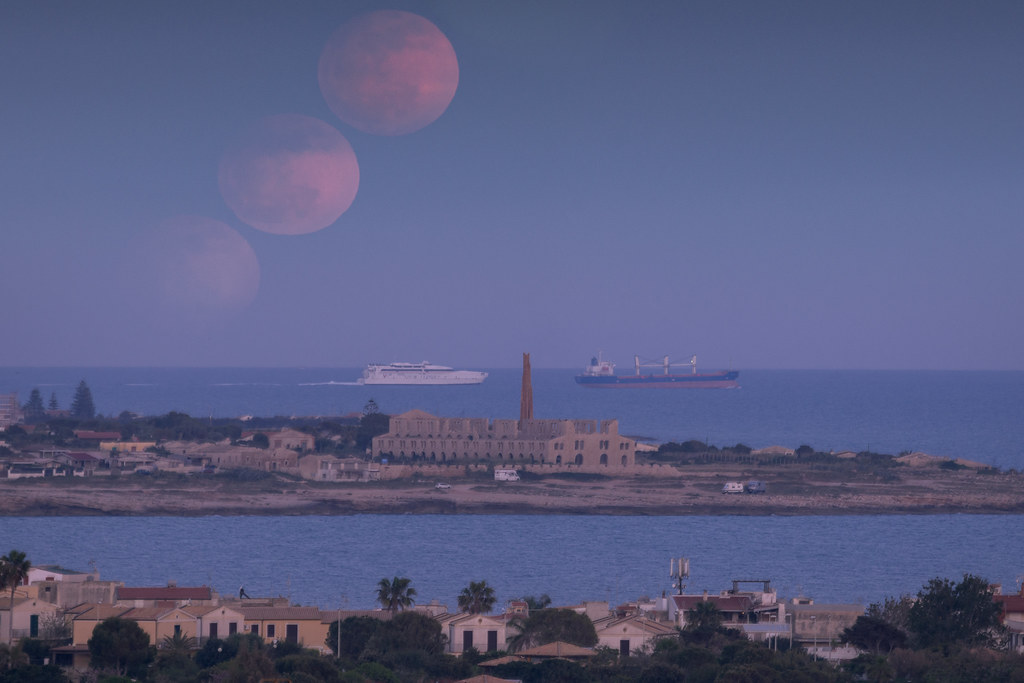 Flower Full Moon by Salvatore Cerruto, su Flickr
Flower Full Moon by Salvatore Cerruto, su Flickr
Flower full moon sequence during partial penumbral eclipse. The moon is rising over the old furnace in Sampieri, a valuable example of industrial archaeology in Sicily, very popular among the locals and also popular to the tourists after being a common scenery in the tv fiction "Il commissario Montalbano".
Technical data: Nikon D800 + Tamron 100-400 3 shot @400mm, f/10, 1/20s, ISO-800
Location: Sampieri, Sicily
Date: 2023-05-05
 Flower Full Moon by Salvatore Cerruto, su Flickr
Flower Full Moon by Salvatore Cerruto, su FlickrRe: Submissions: 2023 May
I love this picture. The rose-colored, multiple images of the Moon look positively translucent. It looks like an incredibly gigantic balloon rising gracefully higher and higher in the sky.salvatorecerruto wrote: ↑Sat May 06, 2023 4:53 pm Flower Full Moon
Flower full moon sequence during partial penumbral eclipse. The moon is rising over the old furnace in Sampieri, a valuable example of industrial archaeology in Sicily, very popular among the locals and also popular to the tourists after being a common scenery in the tv fiction "Il commissario Montalbano".
Technical data: Nikon D800 + Tamron 100-400 3 shot @400mm, f/10, 1/20s, ISO-800
Location: Sampieri, Sicily
Date: 2023-05-05
Flower Full Moon by Salvatore Cerruto, su Flickr
Or else it looks like something out of a science fiction or a fantasy movie. Or else it looks like a dream.
Ann
Color Commentator
Re: Submissions: 2023 May

The Shark Nebula and Surrounding Interstellar Medium
I captured a widefield shot of the amazing interstellar gas and dust in the Cepheus constellation, prominently featuring the Shark Nebula. The picture represents nearly 2.5 hours of integration time from some of the darkest skies in America.
Location: Animas, New Mexico
Date: December 21, 2022
Canon Rebel T5i, Samyang 135mm f/2 lens at f/2.8
28x300 sec
Star Adventurer GTi, ZWO 30mm f/4 guidescope, ASI120MM Mini guidecamera, ASIAIR Pro
Copyright: Imran Sultan
Re: Submissions: 2023 May
Wow. This image looks amazing. Andromeda looks as if it might have been a puff of smoke from the volcano!Vitopastorini wrote: ↑Sat May 06, 2023 3:19 am Story:
Andromeda galaxy over Villarrica volcano, one of the most active volcanoes in Chile and a small number worldwide known to have an active lava lake within its crater. The images were taken near Coñaripe town on the shores of Calafquen Lake, Los Ríos district, Chile. As you know, here in the southern hemisphere it is not easy to see and photograph Andromeda because of its altitude (9° from here, its maximum altitude at 39° South) and just for a couple of months a year. This picture was taken on November 8, 2021, at 23:10, with a waxing crescent moon 22% illuminated. I used a Nikon D850 camera and a Rokinon 135mm telephoto lens to capture a bigger Andromeda with an interesting foreground object, in this case, the volcano. This is not a composite image or blending mode therefore I didn't use a star tracker, they were taken in a single shot wide open at f2, ISO 3200, and 5s shutter speed to avoid star trails. I used Topaz Photo AI for noise reduction and to improve quality and lightroom with the usual workflow and in the case of the timelapse, LRtimelapse.
link of interest:
https://en.wikipedia.org/wiki/Villarrica_(volcano)
this picture is a frame part of a short timelapse video I made too and you can watch it here:
https://1drv.ms/v/s!AmCnYt9akUdHgoxEsaa ... w?e=i2cm1v
Exif:
Nikon D850
Rokinon 135 f/2.0 ED UMC Lens
5 sec f/2 ISO 3500
Copyright: Rodrigo Pastor Pensa
ig: @vitopastorini
Ann
Color Commentator
-
salvatorecerruto
- Ensign
- Posts: 23
- Joined: Thu Aug 22, 2019 2:28 pm
Re: Submissions: 2023 May
Thank you Ann. Thanks for your kind words 
Ann wrote: ↑Sun May 07, 2023 6:22 pmI love this picture. The rose-colored, multiple images of the Moon look positively translucent. It looks like an incredibly gigantic balloon rising gracefully higher and higher in the sky.salvatorecerruto wrote: ↑Sat May 06, 2023 4:53 pm Flower Full Moon
Flower full moon sequence during partial penumbral eclipse. The moon is rising over the old furnace in Sampieri, a valuable example of industrial archaeology in Sicily, very popular among the locals and also popular to the tourists after being a common scenery in the tv fiction "Il commissario Montalbano".
Technical data: Nikon D800 + Tamron 100-400 3 shot @400mm, f/10, 1/20s, ISO-800
Location: Sampieri, Sicily
Date: 2023-05-05
Flower Full Moon by Salvatore Cerruto, su Flickr
Or else it looks like something out of a science fiction or a fantasy movie. Or else it looks like a dream.
Ann


